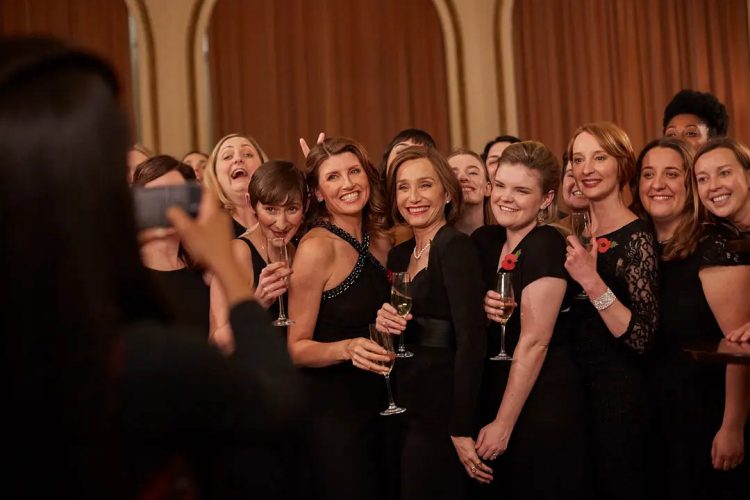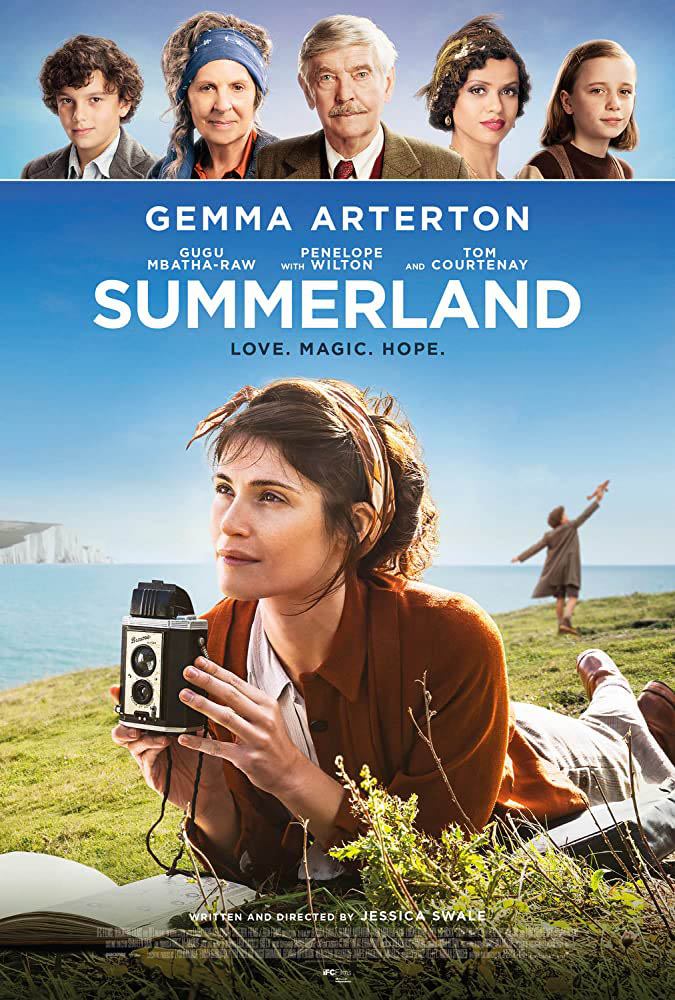In “Summerland”, Alice Lamb is entrusted with the care of a young boy seeking safety from his London home in her Kent cottage during the height of World War II. After a brief scene with an older Alice in the 1970s (a brief turn from an always game Penelope Wilton), the film travels to its focus in the 1940s, where Gemma Arterton plays the reclusive and prickly Alice. Her reclusive routine is interrupted when Frank, the young boy, turns up – forcibly entrusted to her care to keep him safe while his dad is at war, and his mother tries to stay afloat in London. Neither Alice, nor us, is quite sure how or why the boy appears. She does not want to be caretaker for a child. But, finding a home for a child is difficult so she gives the authority one week to find alternative housing while marks time with her unwanted houseguest. Will a week be enough for Frank to charm Alice out of her hermit life type? You guess.

It is not an intrinsic flaw that we can predict where “Summerland intends to take us. Alice’s heart will be reluctantly warmed by Frank’s childhood enthusiasm, and the two will strike up a tentative bond as Alice will slowly grow less cantankerous. So, “Summerland” treads familiar ground as Alice begins to care for Frank and invites him into her literary world and her writings on mythology. The central myth, which gives the film its name, is “Summerland” – a mythical floating island that is the pagan version of heaven. Like any recluse, Alice was not always a hermit. And Frank’s appearance also precipitates a series of flashback as Alice recalls her university days when she enjoyed a brief, but ill-fated romance, with an eclectic writer – Vera – who left her to pursue her desire of starting a family. Soon enough, those two competing storylines converge.
Eventually Jessica Swale (she directs and writes) makes good on the reason for those flashbacks, in a plot development intended for tears but straining credulity and our commitment to the film. “Summerland” has so many intriguing, if disparate, parts that could work if put together in a convincing way. Instead, though, the film rarely feels propulsive , retaining strains of superficiality rather than thoughtfulness. The superficiality could be read as metaphorical if the film were more intentional about its narrative. In many ways, “Summerland” is a pastoral. Laurie Rose’s cinematography dutifully observes the Kentish village that enchants and frustrates Alice. The very idea of the mythical Summerland recalls ideas of a kind of a rustic Shakespearean enchantment – a kind of summerish version of something like “The Winter’s Tale”, maybe. But, the blend between the fantastical and the realistic feels more muddled than emphatic. And the film looks too pristine for the real emotions it wants to excavate.
The film has so many good intentions. Arterton is given the only three-dimensional character and credibly strings together the film’s rough creation of this woman who feels too much like a contemporary stand-in for mid-century spinsterhood. The film’s lesbian themes are naturally invited into the story rather than feeling seismic. But that easiness is the problem. The implications of the film – its interracial romance, its story of womanhood in a time when men are absent, its flirtations with death – all feel too easy to be impactful. Any film set during a war will feature news of death, and when the requisite scene comes in “Summerland” it all goes down too easy, like the film it’s in. It means well, but it all feels so insubstantial. Gugu Mbatha-Raw is tasked with playing a fantasy version of an object of affection that feels impossible to deepen, for all her valiant attempts. Swale is working towards a moral that is well-intentioned and progressive, but “Summerland” only understands these women as means to an easily predicted end.
There’s a similar message of a death announcement in “Military Wives”, where a group of women on the home front form a choir to distract them from their partners at war in Afghanistan. It comes in the middle of the film’s third act. By this time, the brittle Kate and the careless Lisa, both wives of soldiers, have worked out a truce to lead the women’s choir of military wives. But, war means death and the news of a soldier’s death displaces the group when a wife’s husband dies. The character is a minor one, and yet the entire sequence in “Military Wives” feels emotionally visceral in a way that nothing in “Summerland” comes close to. And it’s not because “Military Wives” isn’t working with those familiar tropes of heartbreak and inspiration.
There is a prickly woman who must learn to show empathy in “Military Wives”, too. Kristin Scott Thomas maintains British stoicism with her stiff upper lip, trying to reluctantly cajole the group of military wives to maintain female camaraderie as their husband’s fight. Sharon Hogan’s unpredictable Lisa interrupts Kate’s uneasy hold on the women and the two women begin a tentative struggle to build a women’s choir from the group. The screenplay from Rachel Tunnard and Rosanne Flynn is thoughtful enough about these women and their foibles so that each military wife feels like a specific person so that this feels like more than just an automated retracing of the usual British-underdog drama which director Peter Cattaneo (of “The Full Monty”) has experience with.
To be clear, “Military Wives” is a classic British-underdog drama. We can all predict that its final sequence will depend on the choir having to perform in front of a large audience, and getting their act together in ways that seem impossible at first but ultimately achievable and inspirational. But, there’s a tenderness and warmth to the film’s clear-eyed recognition that the tropes “Military Wives” clings to are a specific manifestation of the routines that the wives themselves hold on to, to sustain themselves through unpredictable times of war and peace. Hubert Taczanowski’s cinematography cuts through the sentiment presenting the images with clarity and incisiveness; little here feels inconsequential.
“Military Wives” gains significant value from the way it refuses to sand off the sharp edges of the story and the people in it. Even the requisite change of heart at the film’s end, when prickly Kate must learn to be more open, feels more effective, and not just because of the excellent turn from Kristin Scott Thomas. Even when it’s straining towards notes to make us feel good, “Military Wives” is recognising the uneasiness that is at the centre of life during war time. There is a moment of shared grief between Scott Thomas and Greg Wise (as her husband) that lacks any artificial overtures of oversentimentality, and instead delivers a thoughtful engagement with grief that feels welcome in its profundity. The film benefits from the editing from Anne Sopel and Lesly Walker that turns the mundane lives of these women into their own metaphorical wartime dramas; and, the film’s final montage, featuring the requisite images of the real persons the story is based on, made my eyes well up even as I recognised exactly where the story was going.
Both “Summerland” and “Military Wives” explore the ways that women must cope with, and respond to, life during wartime. And both films set themselves up as small British films intended to provide a tearjerker-feel-good film experience that tugs at the heartstrings but offer something like hope by the end. It’s a well-trod formula. And, that familiarity is hardly objectionable by design. But, when placed against each other, it’s fascinating to see the ways that familiar tropes can work to deepen or flatten a film.
Summerland is available for purchase or rental on Vudu, iTunes, while Military Wives is available for purchase or rental on Hulu, Amazon Prime, and iTunes.







